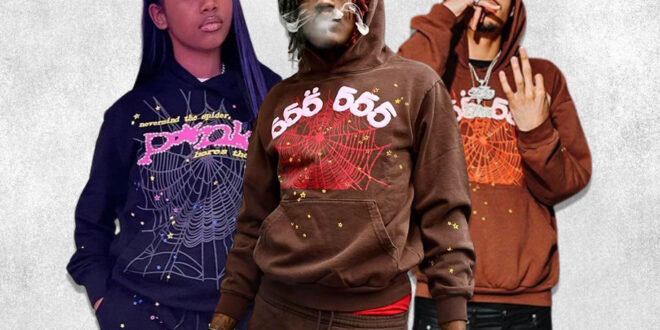The Rise of Fast Fashion
The fast fashion industry has transformed the way people consume clothing, offering the latest trends at incredibly low prices. However, in Visit Now Spider hoodie beneath the allure of affordable fashion lies a grim reality: the exploitation of workers in developing countries. This article delves into the exploitative labor practices that drive the fast fashion industry, highlighting the human cost of our insatiable demand for cheap, disposable clothing.
Fast fashion refers to the rapid production of inexpensive clothing that mimics current fashion trends. Brands like Zara, H&M, and Forever 21 have built their empires on this model, which relies on quick turnaround times, high-volume production, and low costs. To achieve these objectives, these companies often outsource production to factories in developing countries where labor is cheap, regulations are lax, and workers are easily exploited.
Exploitative Labor Practices
At the heart of fast fashion’s success is a labor force that is grossly underpaid and overworked. In countries like Bangladesh, India, Vietnam, and Cambodia, garment workers toil under harsh conditions for meager wages. The following are some of the most egregious labor practices prevalent in the fast fashion industry:
1. Poverty Wages: Garment workers in developing countries are paid far below a living wage. According to the Clean Clothes Campaign, a worker in Bangladesh earns around $95 a month, while the estimated living wage is closer to $400. This wage disparity forces workers to live in abject poverty, often unable to afford basic necessities like food, shelter, and healthcare.
2. Long Working Hours: To meet the demands of fast fashion brands, factory workers are often required to work excessive hours, sometimes up to 16 hours a day, seven days a week. Overtime is frequently unpaid, and refusal to work extra hours can result in termination. This relentless schedule leaves workers exhausted and with little time for rest, let alone family or personal life.
3. Unsafe Working Conditions: Many fast fashion factories operate in unsafe conditions, with little regard for worker safety. The 2013 Rana Plaza collapse in Bangladesh, which killed over 1,100 workers, is a tragic reminder of the dangers these workers face. Factories are often overcrowded, poorly ventilated, and lack basic safety measures, putting workers at constant risk of injury or death.
4. Child Labor: Child labor is another dark aspect of the fast fashion industry. Despite international laws prohibiting the employment of children, many factories in developing countries still employ underage workers. These children are often forced to work long hours in hazardous conditions, sacrificing their education and childhood for the sake of cheap labor.
5. Gender Discrimination and Abuse: The garment industry is predominantly female, with women making up about 80% of the workforce. These women are often subject to gender discrimination, sexual harassment, and abuse. They are paid less than their male counterparts, have fewer opportunities for advancement, and are often denied maternity leave or forced to work during pregnancy. In extreme cases, women who try to organize or demand better working conditions face violence and intimidation.
The Role of Brands and Consumers
Fast fashion brands are fully aware of the exploitative practices in their supply chains, yet they continue to prioritize profit over people. While some companies have pledged to improve working conditions and pay fair wages, these efforts are often superficial or poorly enforced. The pressure to produce clothing quickly and cheaply outweighs any genuine commitment to ethical labor practices.
Consumers, too, play a significant role in perpetuating this cycle of exploitation. The lure of trendy, affordable clothing encourages overconsumption and a throwaway culture, where garments are discarded after just a few wears. This constant demand for new fashion drives the need for cheap labor, perpetuating the exploitation of workers in developing countries.
The Human Cost
The human cost of fast fashion is immense. Workers in the industry face physical and psychological harm, with little hope for a better future. The lack of fair wages and safe working conditions keeps millions trapped in a cycle of poverty, while the relentless pace of production takes a toll on their health and well-being.
Moreover, the exploitation of workers in the fast fashion industry is a violation of their basic human rights. Everyone deserves to work in a safe environment, earn a living wage, and be treated with dignity and respect. The fast fashion industry, however, continues to deny these rights to millions of workers around the world.
Towards a More Ethical Future
Addressing the exploitative labor practices in the fast fashion industry requires a concerted effort from brands, governments, and consumers. Check it now https://www.sp5derhoodieshop.net/ Brands must take responsibility for their supply chains, ensuring that workers are paid fairly and work in safe conditions. This includes conducting regular audits, enforcing labor standards, and being transparent about their practices.
Governments in both producing and consuming countries have a role to play by implementing and enforcing stricter labor laws, holding companies accountable, and providing workers with legal protections. International organizations can also help by setting global labor standards and monitoring compliance.
Consumers, too, have the power to drive change by making more ethical fashion choices. Supporting brands that prioritize fair labor practices, buying less, and opting for sustainable or second-hand clothing can reduce the demand for exploitative labor. Public awareness campaigns and education can also help shift consumer behavior towards more responsible consumption.
Conclusion
The fast fashion industry’s exploitative labor practices are a stark reminder of the human cost behind the clothes we wear. While the industry has provided affordable fashion to millions, it has done so at the expense of workers in developing countries who are denied their basic rights. By demanding better practices from brands, supporting ethical fashion, and advocating for stronger labor protections, we can begin to address the injustices in the fast fashion industry and move towards a more equitable and sustainable future.
 Personal Finance and Attractive Interest Rates Unlock Smart Savings with Low Rates and Expert Financial Tips
Personal Finance and Attractive Interest Rates Unlock Smart Savings with Low Rates and Expert Financial Tips







